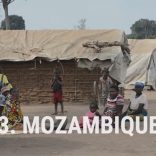Mozambique: The world’s third most neglected displacement crisis in 2024- NRC
Crowds, long queues and packed buses mark first day of school in Mozambique

Photo: Lusa
Maria Rosa decided to accompany her eight-year-old son to the Triunfo Primary School (Maputo), but the crowd at the institution’s door and the long queues at the bus stops made her fear for the spread of Covid-19 in the Mozambican capital.
Maria Rosa’s son is among the millions of students from the 1st to the 12th Grade in Mozambique who returned to school on Monday, in an atypical context marked by division of classes, classes in alternate groups and classes on Saturdays, due to Covid-19.
At Triunfo Primary School, several parents had decided to take their children to class. Some were there to look into the preventive conditions created, others to regularise documents, but the limitations adopted to avoid crowding had a counterproductive effect, creating a degree of confusion that required police intervention.

“We are afraid of this crowding, but the children need to go back to school,” Maria Rosa said from the middle of the screaming crowd trying forcefully to enter the school.
According to the school’s pedagogical director, the confusion resulted from the fact that some parents had waited until school started to finish their children’s enrolment.
“It is a busy day. Some parents have set the first day of classes aside to inspect their children’s classrooms, creating this confusion,” Lúcio Mavundla commented.
But the fear of Maria Rosa and so many other parents is not limited to prevention within schools, many of which have imposed hygiene measures such as the mandatory use of masks, measuring the temperature at the entrance and distributing taps and buckets for children to wash their hands.
The main problem is the long queues for public transport, where the distance between people requested by the authorities in view of the spread of Covid-19 is an illusion, given that no one wants to miss the few vehicles available to transport passengers in Maputo.
“The transport crisis is chaotic. My daughter went to school today, but it was difficult. Conditions were created at schools, but the government should have organised transport for children,” said Augusto Xavier while waiting for public transport in a queue of dozens at the Praça da Juventude in Maputo.
While fear reigns among parents, happiness is visible among teachers and students, even though, in addition to pens and notebooks, masks and disinfectants have become mandatory items.

“It was a difficult year, we spent a lot of time not going to school,” one 15-year-old student at Laulane Secondary School Lígia Alessandra bemoaned.
Portuguese language teacher at Escola Secundária de Laulane Maria Aguida told Lusa that although some parents had betrayed a degree of apprehension, the children were happy and the institutions had guaranteed basic conditions to prevent the spread of the disease.
“The children were very anxious to get back to school. Today, some arrived as early as 6:00 a.m.,” the teacher said, adding that, with the alternating classes strategy, the school is far from full.
The 2021 academic year is governed by the motto “For an Inclusive, Patriotic and Quality Education”, and the Ministry of Education and Human Development of Mozambique expects about eight million students from the 1st to the 12th grade.
Mozambique was under a state of emergency between April and September, 2020, since when a state of calamity has been declared, a legal designation encompassing various restrictions aimed at preventing the spread of Covid-19, including the suspension of classes.
The government never declared mandatory general confinement [“lockdown”], but there are limits on the capacity of certain public spaces and events, most of which are suspended (religious services, conferences, sports events, among others).
Shops opening hours are limited, and the beaches and pre-school education are closed (although the other levels of education are open). The greater Maputo region has also, since February, had a night curfew between 9:00 p.m. and 4:00 a.m..
The country has registered a total of 746 deaths from Covid-19 among 66,212 cases, of which 79% are accounted fully recovered.













Leave a Reply
Be the First to Comment!
You must be logged in to post a comment.
You must be logged in to post a comment.